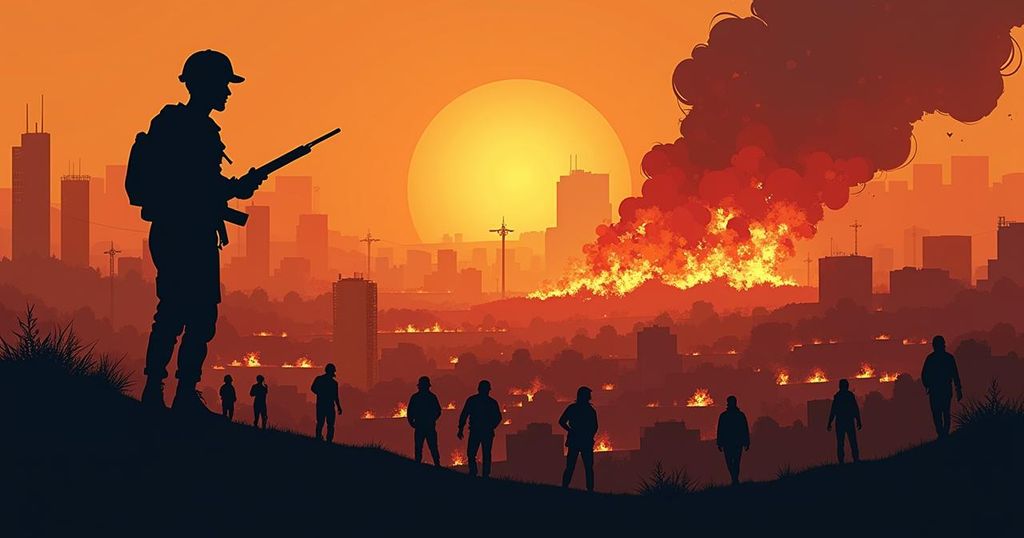Chad: A History of Conflict and Governance Challenges

Chad, a Central African republic, has faced ongoing internal conflict, notably since the late 20th century, marked by a series of civil wars and political coups. After Idriss Déby’s rise to power in 1990, the regime promised democracy but remained associated with corruption and human rights abuses. The recent death of Déby in April 2021 significantly impacts Chad’s political landscape as his son takes interim leadership amid continued instability.
The Republic of Chad, located in Central Africa, has experienced persistent internal strife, including civil wars and political upheaval, especially since the late 20th century. A significant turning point occurred in April 1989 when President Hissène Habré’s regime faced a coup plot led by military figures aligned with opposition forces. While Habré managed to suppress the coup attempts, he ultimately fled the country in 1990 following attacks from Idriss Déby’s Forces of the Movement for Chadian National Salvation. Upon taking power, Déby suspended the constitution and initiated a new governmental structure, promising a transition to multiparty democracy, despite allegations of receiving military support from Libya. Déby’s administration faced fierce opposition, leading to several coup attempts and a national conference that restructured the government in 1993. Despite being elected in the first democratic elections in Chad in 1996, Déby’s regime was marked by ongoing rebellion and instability, particularly from the Mouvement pour la Démocratie et la Justice au Tchad (MDJT) beginning in 1998. Notably, while his administration managed to sign peace accords in the early 2000s, allegations of human rights abuses and governmental corruption persisted throughout his rule. By 2003, Chad emerged as an oil-producing nation, yet much of the revenue ostensibly for economic development was diverted into military expenditures in response to rebel insurgencies. This cycle of violence resulted in the displacement of thousands of citizens and exacerbated regional tensions, notably with Sudan, due to cross-border conflicts driven by the Darfur crisis. In response to the growing threat of Islamic militant activity, particularly by Boko Haram, Chad positioned itself as a regional leader in counter-terrorism. Despite international backing, Déby’s regime remained repressive, characterized by the arrest of dissenters and political oppression. In the lead-up to the 2016 elections, widespread protests emerged against Déby’s governance; however, he was declared the victor amid allegations of electoral malpractice. Further constitutional changes in 2018 aimed to solidify his power, provoking domestic unrest and delays in parliamentary elections. The backdrop of violence persisted until his abrupt death in April 2021 during a battle with rebels, further complicating Chad’s political climate as his son assumed power, marking another chapter in the country’s turbulent history.
Chad’s political landscape has been tumultuous since independence from France in 1960. The struggle for power has resulted in numerous coups, civil wars, and persistent opposition movements. The rise of Idriss Déby in 1990 marked a new era, characterized by attempts to consolidate power while facing enduring resistance from various rebel factions. Additionally, regional conflicts, particularly the Darfur crisis, have also played a significant role in shaping Chad’s socio-political challenges, as the country struggles with refugee influxes and cross-border tensions with Sudan and the Central African Republic. The governance by Déby has often been criticized for its authoritarian nature and failure to effectively address issues of corruption and human rights abuses, factors complicating Chad’s potential for stability and development.
The Republic of Chad has endured significant political strife and conflict since its independence, with notable periods of civil war and authoritarian rule under leaders such as Hissène Habré and Idriss Déby. Despite initiatives aimed at establishing democracy and peace, the ongoing challenges of corruption, human rights violations, and militant violence present formidable obstacles to national stability. The recent shift in leadership following Déby’s death may shape the future trajectory of Chad’s governance and its efforts to address decades of turmoil.
Original Source: www.britannica.com







